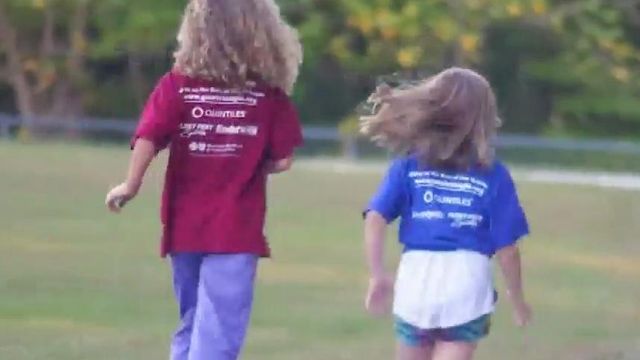Can't to Can: Six ways to boost tween girls' confidence in STEM, other topics
Scared of math? Afraid of computer science? Friendship troubles? Girls on the Run executive director Juliellen Simpson-Vos shares ways to talk to tween girls and help build their confidence.
Posted — UpdatedThese days, parenting conversations with friends or colleagues no longer focus on nap times and potty training. With two girls, ages 7 and 12, they're turning to more life-changing topics. And, in the last couple of months, I've noticed a little trend among the moms I know with tween girls heading to middle school.
Here's how those conversations have opened ...
"My daughter has always been interested in computers, but she doesn't think she's smart enough for a computer science class for beginners in middle school next year."
"My daughter has always gotten fours and As in math, but now she's telling me she's no good at it - despite those great grades."
It's as if the statistics that I've read for years - that tween girls start expressing a disinterest in so-called STEM topics or the belief they are no good at them - had come to life.
In high school, nearly 75 percent of girls say they are interested in science, technology, engineering and math topics, but "perceived gender barriers are still high for girls and may help explain why STEM fields aren’t their top career choices," the report says. By college, women earn only 20 percent of bachelor's degrees in engineering, computer science and physics, according to the report.
Outdated stereotypes that girls aren't good at math and science, the report says, hold girls back. Girls also are more likely to give up on a course of study if they feel like the material is too difficult, the report says.
Girls on the Run is a life skills program for girls ages 8 to 13, which combines preparation for a 5K with a curriculum that emphasizes ways to live a confident, happy and healthy life. The afterschool program doesn't specifically address science and math, but it addresses the things that can lead to a girl's disinterest in the subjects, Simpson-Vos said.
"Our curriculum addresses how to re-frame those negative messages and how to take perceptions about girls and turn it on the heads so they can critically look at 'why it is that I think this and what is actually true,'" she said.
If your daughters start expressing doubts about their abilities, Simpson-Vos, who hold's a master's degree in education, shares these tips to help turn the conversation:
She recommends having a conversation like this with a tween girl about a theoretical issue at school: "Remember when you didn't think you could stand up to that person who was cheating off your test, but you came up with a strategy and it worked? Let's unpack it and come up with a strategy just like you did for that other thing."
"They like to have things come kind of easy to them now," Simpson-Vos said. "If there is a pain point and they are challenged a little bit, it makes them nervous. It makes them self doubt themselves. Just because it might be kind of challenge or difficult for you doens’t mean you aren't good at it and it doesn't mean you shouldn’t work at it. Not everything in life is going to be easy."
With Girls on the Run, ending the season by running a 5K is one way the program encourages girls to set goals and stretch their limits. "None of them usually have run a 5K and they're thinking, 'I'm going to do what at the end?'" Simpson-Vos said. "But over the course of the season, we keep setting goals. That end of season 5K is such a confidence-building experience for them."
The start of the training program might have been tough, Simpson-Vos said, but, now they're proud of their success. "It being hard doesn't mean I can't do it," she said.
"Then it doesn't just place the responsibility on the girl," Simpson-Vos said. "If they see that she did it, she did it and she did it and I've heard their stories and they resonate with me, then why couldn't I do it?"
Simpson-Vos said Girls on the Run is actively recruiting new coaches, particularly minority women and those in STEM fields, to make sure girls in the program are exposed to new ideas and new ways of thinking. Right now, about 7 percent of coaches are medical professionals.
Political connotations aside, "that's the muscle that we're trying to build in young girls - this recognition that you can do this but it doesn't mean that it's going to be easy," Simpson-Vos said. "You need to keep building up this muscle and use the patience that you have to work through these issues" - whether it's a tough math problem or an argument with a friend.
"We talk about girls having limitless potential," she said. "And when they start boxing themselves in and thinking there are things that they can’t do, it’s not allowing them to fill that limitless potential."
Tell girls, "you have a responsibility to bring these talents into the world," Simpson-Vos said.
Related Topics
• Credits
Copyright 2024 by Capitol Broadcasting Company. All rights reserved. This material may not be published, broadcast, rewritten or redistributed.





